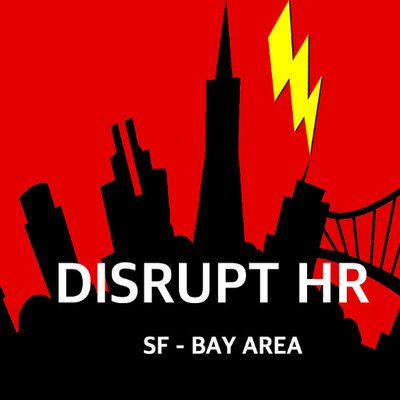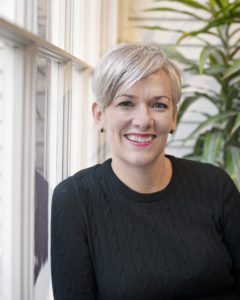
Ahead of DisruptHR San Francisco on Oct 17, we interviewed speaker Andrea Robb, Talent Design Director at Airbnb.
 Andrea is a designer, researcher, leader, and coach in her role as Talent Design Director at Airbnb, and in her prior roles at Lucasfilm and Levi Strauss & Co. She also started an independent practice in organizational development and leadership. In her roles inside companies, she helps leaders and employees grow together, using her experience in psychology, design thinking, and neuroscience. Working with creative wizards, technical geniuses, bottom line business thinkers, and mission-driven visionaries, she helps people think about our differences and similarities so the diversity of perspectives improves their work together.
Andrea is a designer, researcher, leader, and coach in her role as Talent Design Director at Airbnb, and in her prior roles at Lucasfilm and Levi Strauss & Co. She also started an independent practice in organizational development and leadership. In her roles inside companies, she helps leaders and employees grow together, using her experience in psychology, design thinking, and neuroscience. Working with creative wizards, technical geniuses, bottom line business thinkers, and mission-driven visionaries, she helps people think about our differences and similarities so the diversity of perspectives improves their work together.
At Airbnb, she is a Host, Guest, and Employee – occupying all three groups they consider as their community. And the common thread between these groups is Airbnb’s mission – to help anyone belong anywhere.
Please tell us a little about yourself – your career path and expertise.
As the youngest of a gaggle of children, I grew up curious about how people tick and how groups or systems work. For most of my career, I have worked at the cross-section of people and organizations, both in the public and private sectors. People are complex. Organizations are too. Put them together and add a little growth or stress? I love those kinds of puzzles.
What made you decide to become a speaker at DisruptHR San Francisco?
I am famously unconcise. I like the challenge of sharing useful information and inspirations in 5 minutes or less. And I want to learn from others at this event. You can’t be innovative if you are not constantly learning and getting out of your normal element.
What will you be speaking about at DisruptHR San Francisco?
Hypergrowth and the multitude of challenges it can cover up. Growth for growth’s sake is the currency in Silicon Valley. I see a lot of young, very tired, people who are learning quite a bit, but sometimes learning the wrong habits for longer-term growth and perspective.
Why is your topic important to HR and Talent pros?
Growth can be the enemy of learning and diversity. Two things Silicon Valley companies profess as their top HR goals. Something has to give.
You only get 5 minutes to speak to the audience. What unique challenges, and indeed opportunities, does such a condensed speaking slot offer?
I like the challenge – specifically to condense a lot of my thoughts about fast-growth companies – and professional growth – in a pithy story that can both entertain as well as offer others practical ideas.
Please share 2 or 3 ‘influencers’ in the HR, leadership and/or recruitment space you follow and tell us why.
Aaron Dignan and the folks at The Ready. They are telling a very useful and compelling story about the organization development systems and practices of the past – and the ones we need in the future. They are not just talking the talk of “Future of Work” though. They are offering insightful, hands-on, practical consulting around responsive, dynamic organizations and what they need to do to grow well. Best of all, they don’t follow a classic chevron chart of recommendations off the shelf. They jump in and solve where the need is identified by your organization, and then fan out from there. It’s much more effective in my opinion.
The HR Gazette is a big believer in the shift from traditional thoughts of HR to embracing modern HR as part of ‘people and culture’. What does ‘people and culture’ mean to you?
People and culture explains well the domain of “HR.” It’s not just the people – but also the culture – that are the most important outcomes of an HR team’s focus and efforts.
What do you think will be the major developments in the Talent space to watch out for in the next 12 months and why? For example, how does the growing numbers of Millennials in the workplace shape traditional talent management approaches?
First, I think the bigger story is the mix of generations – not just the Millennials – and how the smartest companies will redefine the traditional career path and ‘job.’ For example, Baby Boomers are going to live longer than generations before them. They are 80M strong in the US. As big as the Millennial generation they brought into this world. I’d pay some attention to a smart mix of many experiences in your talent pool. Not just Millennials. And pay close attention to the ‘squeezed middle management of our age’ – Generation X managers – who are not seeing as many roles open up for leadership above them with Baby Boomers delaying retirement, and the younger generation expecting progression into management roles fast.
As for a major development? I’d watch for innovative diversity approaches that go beyond employee resource groups and training. Real, innovative practices around how we learn to talk about difference – and integrate others’ perspectives – is the one to watch. I’ve seen it in action and done very well. It convinced me that it is a skill that can be built – and needs building in our global business environment. We need to go beyond knowing unconscious bias exists based on how our brains are wired socially.

